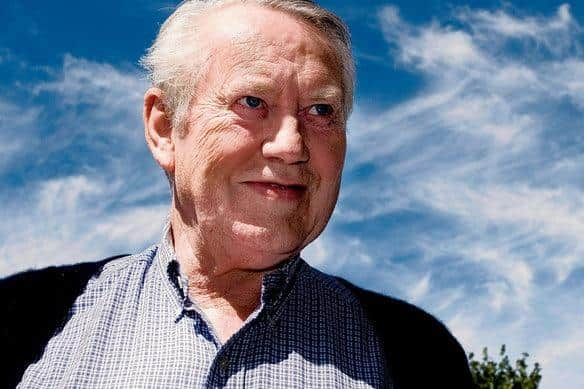Remembering Chuck Feeney: the duty free shopping billionaire who gave away his wealth - who was he?
and live on Freeview channel 276
The world has lost one of its unsung heroes who chose to remain out of the spotlight despite the many lives he helped and changed for the better. Billionaire philanthropist Chuck Feeney's death has highlighted how he spent 40 years giving away the wealth he accumulated through duty-free shopping.
He died at the age of 92 on October 9, 2023, after a life spent helping others. After starting Duty-Free Shoppers (DFS) in Hong Kong back in the 1950s with a university friend, Feeney made his wealth through the business fairly rapidly. The business quickly began selling alcohol and cigarettes to US military personnel who were in southeast Asia. From here, Feeney moved on to selling jewellery, watches and handbags.
Advertisement
Hide AdAdvertisement
Hide AdBut the billionaire greatly differed in how he lived his life compared to other similarly wealthy people. Instead of a mansion, Feeney lived in a two-bedroom apartment in San Francisco and brought clothes from high street brands. He would fly the world in economy class and even wore a $10 Casio watch.
Feeney was hailed for using his wealth to help charities and other causes. A vast number of his donations were to causes in Northern Ireland, where he could trace his ancestry to Co Fermanagh, and his contributions to both sides during the Troubles led to his involvement in the 1998 Good Friday Agreement.


Early career and personal life
Born Charles Francis Feeney in Elizabeth, New Jersey, on April 23 1931, the billionaire was the second of three children of Leo Feeney, an insurance underwriter and his wife Madaline, a nurse. Both parents were of Irish descent and had moved from Philadelphia in search of a better life closer to New York. From a young age, Feeney showed his skills as an entrepreneur. When he was 10, he sold Christmas cards door-to-door, and he would also charge neighbours 25 cents to clear snow from their driveways.
He signed up for the US Air Force in 1948 where he trained as a radio operator. Here he was given the name Chuck and was sent to Japan. Following demobilisation after the Korean War, he studied under the GI Bill at Cornell Hotel School in Ithaca, upstate New York, taking extra lessons in French and Russian. He capitalised on a lack of fast-food and hungry students by making and selling sandwiches.
Advertisement
Hide AdAdvertisement
Hide AdBy the age of 26 Feeney was in the French town of Villefranche-sur-Mer, home to the US Sixth Fleet. The Navy did not allow alcohol to be consumed on its ships, but sailors could buy up to five bottles of duty-free spirits and have them sent home as unaccompanied baggage. With up to 50 ships, whose crews rotated three times a year, the potential was great. Five bottles bought in Europe cost $10 but sold for $30 in the US.
Orders were soon piling up and before long he and his business partner had started DFS in south-east Asia, home to an even bigger market of US servicemen. Around 1980 – and influenced by Andrew Carnegie’s essay on wealth – Feeney decided on his distinctive plan of “giving while living”. In 2011 he signed the Giving Pledge, founded by Bill Gates and Warren Buffet to encourage the rich to donate the majority of their wealth to good causes. He closed Atlantic Philanthropies in 2020, having achieved his goal of giving away all its money, more than $8 billion in total.
He married first, in 1959, Danielle Morali-Daninos, a French-Algerian student. In 1995 he married again to Helga Flaiz, his former secretary, who survives him with four daughters and a son from his first marriage.
How did Chuck Feeney give away his wealth?
It was first revealed by the New York Times in 1997 that back in 1984 Feeney had moved $500 million of his wealth in DFS to Atlantic Philanthropies - a Bermuda-based organisation that allowed the businessman to pursue his charitable intentions.
Advertisement
Hide AdAdvertisement
Hide AdThe value of this trust grew and in January 1997, he was aided by an injection of $1.67 billion when its stake in DFS was sold to the French luxury goods conglomerate Moët Hennessy Louis Vuitton (LVMH). Eventually, it amassed assets of more than $3.5 billion.
Feenty pursued a broad remit on where his money would help others. For example, he made grants to Aids clinics in South Africa, educated Vietnamese children on traffic safety and funded cancer research in Australia - to name but a few. He even covered the costs of plastic surgery for children with facial deformities in the Philippines.
None of the causes he supported would ever have his name attached - showing Feeny's intentions of philanthropy for the sake of philanthropy, and not to boost his own public image.
In Ireland, Feeney helped the University of Limerick finance a concert hall, a library and a sports arena. Queen’s University Belfast was another beneficiary of his wealth and received £107 million between 1993 and 2015.
Advertisement
Hide AdAdvertisement
Hide AdBut arguably his biggest project came in Northern Ireland away from the public eye. Here, Feeney helped broker peace negotiations after the 1987 Enniskillen Remembrance Sunday bombing where 12 people died prompted him to act.
In 1996 it emerged that Feeney had been funding Sinn Fein, the political wing of the IRA, with a sum of $200,000 - which was conditional on an IRA ceasefire. Feeney also struck similar deals with loyalist paramilitaries.
In Forbes, Feeney was described as “the man who has arguably done more for Ireland than anyone since Saint Patrick”.
Comment Guidelines
National World encourages reader discussion on our stories. User feedback, insights and back-and-forth exchanges add a rich layer of context to reporting. Please review our Community Guidelines before commenting.
